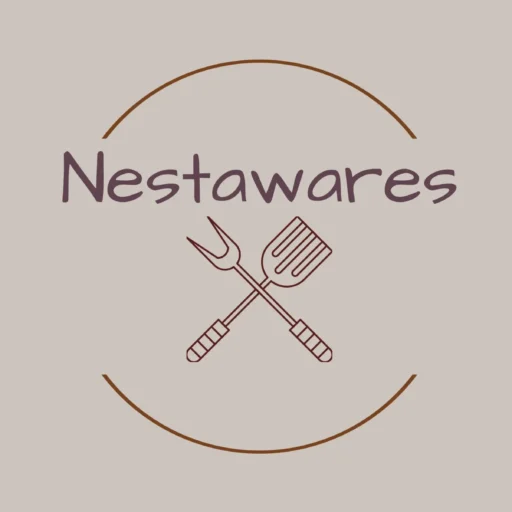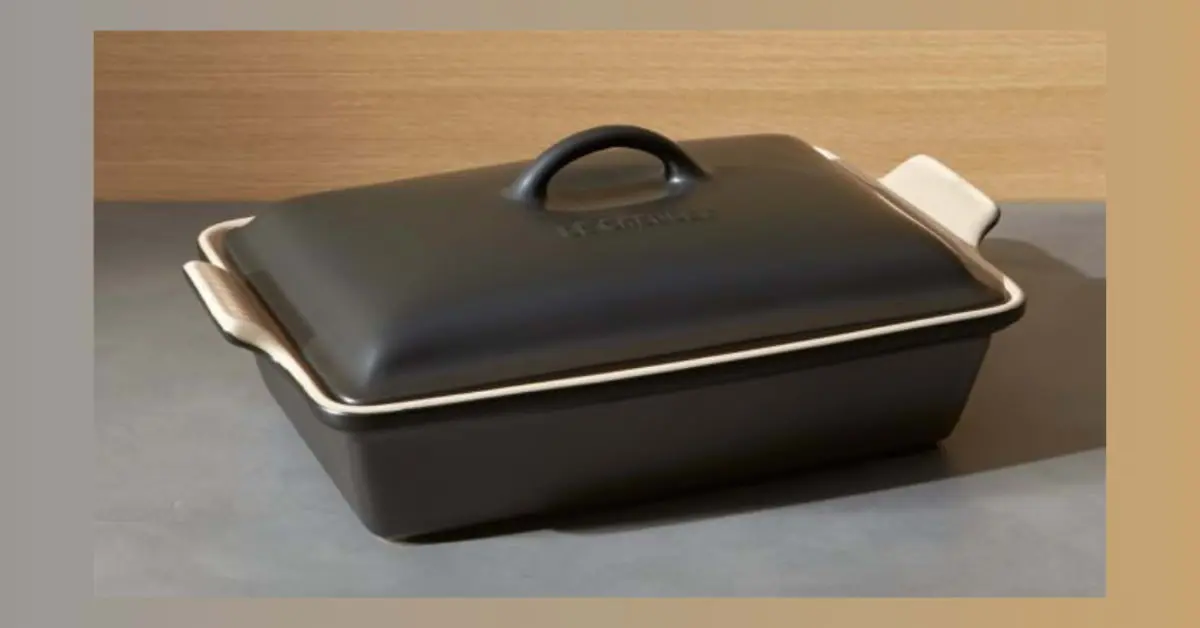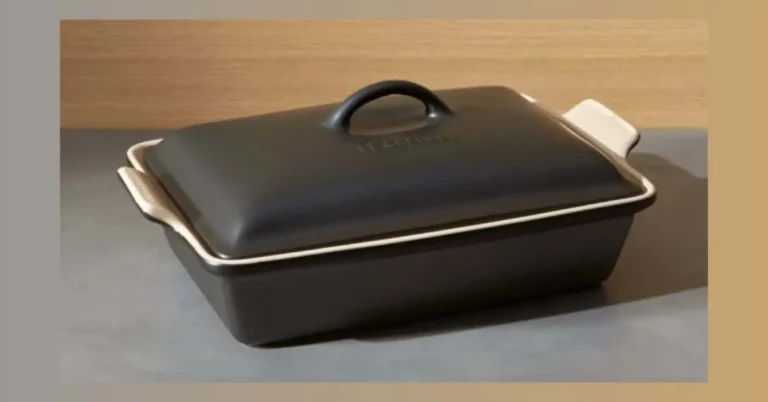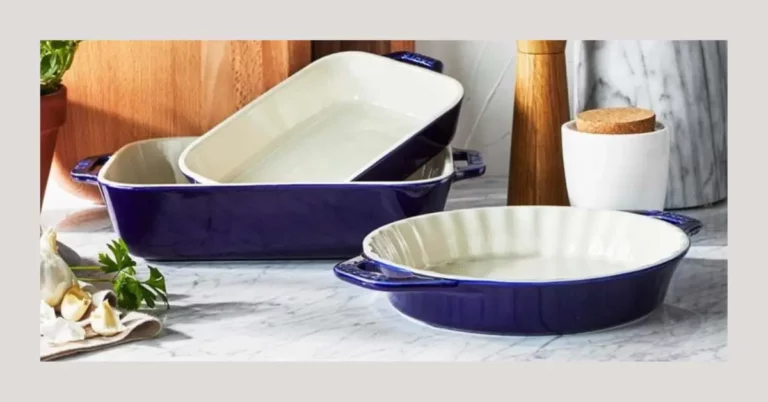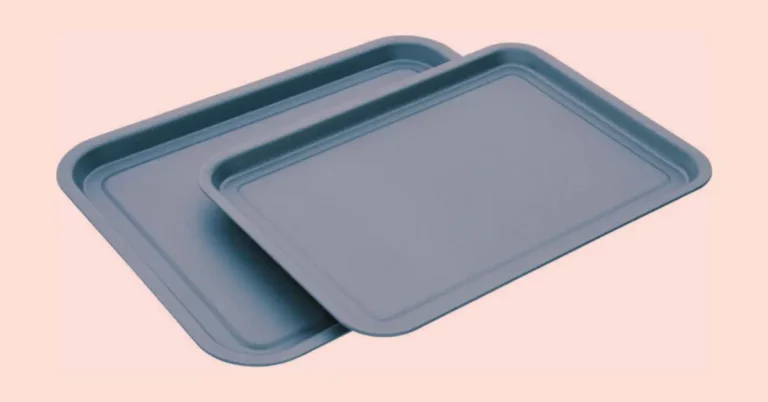Disclosure: As an Amazon associate, I may earn from qualifying purchases
This post is for those who want to know more on stoneware bakeware, and have burning questions that have piqued their curiosity. Whether you’re a seasoned baker or a kitchen enthusiast, we’re here to provide clarity on the wonders and advantages of baking with stoneware.
In this article, we will address frequently asked questions, ranging from the quality and best brands of stoneware baking dishes to comparisons with other materials and insights into professional usage.
First and foremost, you may be wondering if it’s good to bake in stoneware baking dishes. Well, you’d be surprised to know that stoneware boasts remarkable heat retention and even heat distribution, resulting in perfectly baked treats with crispy edges and tender centers.
Its natural non-stick surface allows for easy food release and simple cleanup, making it a favorite among home bakers and professionals alike.
When it comes to the best brands available, we’ve got you covered. We’ll showcase renowned brands that have mastered the art of stoneware craftsmanship, ensuring exceptional quality and durability.
While stoneware offers numerous benefits, it’s important to consider potential disadvantages. We’ll delve into factors like weight and fragility, helping you make informed decisions about incorporating stoneware into your baking routine.
We also talk about how safe stoneware is, to be used in the kitchen. If temperature changes make it leech toxins like lead, and how one can prevent such things from happening.
By understanding the challenges, you can adapt your techniques and maximize the advantages of this exceptional material.
So, whether you’re a baking enthusiast seeking to upgrade your bakeware collection or simply curious about the wonders of stoneware, this article will serve as your go-to resource.
We’re here to answer your frequently asked questions, provide friendly advice, and foster a deeper appreciation for the joys of baking with stoneware bakeware. Let’s dive in!
In this article, we will address frequently asked questions, ranging from the quality and best brands of stoneware baking dishes to comparisons with other materials and insights into professional usage.
First and foremost, you may be wondering if it’s good to bake in stoneware baking dishes. Well, you’d be surprised to know that stoneware boasts remarkable heat retention and even heat distribution, resulting in perfectly baked treats with crispy edges and tender centers.
Its natural non-stick surface allows for easy food release and simple cleanup, making it a favorite among home bakers and professionals alike.
When it comes to the best brands available, we’ve got you covered. We’ll showcase renowned brands that have mastered the art of stoneware craftsmanship, ensuring exceptional quality and durability.
While stoneware offers numerous benefits, it’s important to consider potential disadvantages. We’ll delve into factors like weight and fragility, helping you make informed decisions about incorporating stoneware into your baking routine.
We also talk about how safe stoneware is, to be used in the kitchen. If temperature changes make it leech toxins like lead, and how one can prevent such things from happening.
By understanding the challenges, you can adapt your techniques and maximize the advantages of this exceptional material.
So, whether you’re a baking enthusiast seeking to upgrade your bakeware collection or simply curious about the wonders of stoneware, this article will serve as your go-to resource.
We’re here to answer your frequently asked questions, provide friendly advice, and foster a deeper appreciation for the joys of baking with stoneware bakeware. Let’s dive in!
Frequently Asked Questions
What baking pans does Joanna Gaines use?
Joanna Gaines, the home renovation and cooking personality, has not publicly disclosed her specific brand preferences for baking pans.
However, she has recommended several general tips and guidelines for selecting high-grade baking pans. Here are some of the tips she has shared:
While Gaines has not endorsed any specific brand of baking pans, there are many excellent options available from popular brands such as Nordic Ware, Calphalon, and Wilton.
However, she has recommended several general tips and guidelines for selecting high-grade baking pans. Here are some of the tips she has shared:
- Material: Gaines has recommended choosing baking pans made from high-quality materials such as heavy-duty aluminum or stainless steel. These materials offer excellent heat distribution and durability.
- Size and shape: Gaines has also recommended selecting baking pans in the appropriate size and shape for your specific recipe. For example, a muffin tin for muffins, a sheet pan for cookies, and a pie dish for pies.
- Non-stick: Gaines has recommended using baking pans with a non-stick coating to make cleanup easier and to prevent sticking.
- Quality: Gaines has emphasized the importance of investing in high-quality baking pans that will last for years and provide consistent results.
While Gaines has not endorsed any specific brand of baking pans, there are many excellent options available from popular brands such as Nordic Ware, Calphalon, and Wilton.
Who makes the best bakeware?
There are many excellent brands that make good quality bakeware, each with their own strengths and specialties.
The best bakeware brand for you will depend on your specific needs, preferences, and budget. It’s always a good idea to read reviews, compare prices, and research the quality and durability of different brands before making a purchase.
- USA Pan: This is a top brand for high-quality, durable, and non-stick bakeware, including sheet pans, cake pans, loaf pans, and more.
- Nordic Ware: This is known for its unique and creative shapes of bakeware, including bundt pans and holiday-themed cake pans, as well as for its quality and durability.
- Calphalon: They offer a range of bakeware made from heavy-gauge steel with a non-stick coating, which is easy to clean and provides excellent heat distribution.
- Wilton: Wilton is a popular brand for baking and cake decorating supplies, including bakeware such as cake pans, cookie sheets, and muffin tins, as well as baking tools.
- Le Creuset: Le Creuset offers prime and durable stoneware bakeware, which is known for its even heat distribution and resistance to chipping and cracking.
- Emile Henry: Emile Henry is a French brand that makes quality bakeware and cookware, including stoneware baking dishes and pie dishes.
The best bakeware brand for you will depend on your specific needs, preferences, and budget. It’s always a good idea to read reviews, compare prices, and research the quality and durability of different brands before making a purchase.
Does all stoneware contain lead?
No, not all stoneware contains lead. However, some types of clayware, particularly older or handcrafted pieces, may contain lead in the glaze or clay.
Lead is a toxic substance that can leach into food or drink, so it is important to ensure that any stoneware you use is safe and lead-free.
Modern stoneware produced in the United States must adhere to strict regulations set by the Food and Drug Administration (FDA) and should not contain lead.
Many reputable stoneware brands conduct independent testing to ensure that their products are safe and free from lead and other harmful substances.
If you are unsure whether your stoneware contains lead, it is best to err on the side of caution and avoid using it for food or drink. It is also a good idea to research the specific brand and contact the manufacturer if you have any concerns or questions.
Lead is a toxic substance that can leach into food or drink, so it is important to ensure that any stoneware you use is safe and lead-free.
Modern stoneware produced in the United States must adhere to strict regulations set by the Food and Drug Administration (FDA) and should not contain lead.
Many reputable stoneware brands conduct independent testing to ensure that their products are safe and free from lead and other harmful substances.
If you are unsure whether your stoneware contains lead, it is best to err on the side of caution and avoid using it for food or drink. It is also a good idea to research the specific brand and contact the manufacturer if you have any concerns or questions.
Is stoneware good for everyday use?
Yes, stoneware is a rugged multi-functional material that is suitable for everyday use. It is known for its strength and reliability, making it a great choice for baking, cooking, and serving food regularly.
It is also dishwasher safe, easy to clean, and can withstand high temperatures, making it an ideal material for both oven and microwave use.
They also have a natural and rustic appearance, which many people find attractive and appropriate for everyday use. It is available in a variety of colors, textures, and designs, making it easy to find a style that suits your taste and decor.
However, stoneware, like any material, has its own advantages and disadvantages. It can be heavy and cumbersome to handle, and some types of ceramic baking dishes may be prone to chipping or cracking if not handled with care.
Certain types of clayware may not be suitable for use with acidic or highly seasoned foods, as these can cause the glaze to wear off over time.
It is also dishwasher safe, easy to clean, and can withstand high temperatures, making it an ideal material for both oven and microwave use.
They also have a natural and rustic appearance, which many people find attractive and appropriate for everyday use. It is available in a variety of colors, textures, and designs, making it easy to find a style that suits your taste and decor.
However, stoneware, like any material, has its own advantages and disadvantages. It can be heavy and cumbersome to handle, and some types of ceramic baking dishes may be prone to chipping or cracking if not handled with care.
Certain types of clayware may not be suitable for use with acidic or highly seasoned foods, as these can cause the glaze to wear off over time.
Is stoneware free of toxins?
Stoneware that is made and sold in the United States and other developed countries is generally considered safe and free of toxins when used properly.
Modern stoneware products must meet strict regulations and standards set by the Food and Drug Administration (FDA) to ensure that they are safe for use with food.
However, some older or handcrafted pieces, particularly those made in developing countries, may contain lead, cadmium, or other harmful toxins in the glaze or clay. These substances can leach into food or drink and can be harmful to health.
It is important to ensure that any stone-based kitchenware you use is free of toxins and safe for use with food.
You can check the label or packaging for information on the materials and production methods used, and you can also research the specific brand or product to find out if they conduct independent testing for toxins.
In general, it is a good idea to choose high-quality and reputable brands, follow the manufacturer’s instructions for use and care, and avoid using wares that are damaged or shows signs of wear or chipping.
Modern stoneware products must meet strict regulations and standards set by the Food and Drug Administration (FDA) to ensure that they are safe for use with food.
However, some older or handcrafted pieces, particularly those made in developing countries, may contain lead, cadmium, or other harmful toxins in the glaze or clay. These substances can leach into food or drink and can be harmful to health.
It is important to ensure that any stone-based kitchenware you use is free of toxins and safe for use with food.
You can check the label or packaging for information on the materials and production methods used, and you can also research the specific brand or product to find out if they conduct independent testing for toxins.
In general, it is a good idea to choose high-quality and reputable brands, follow the manufacturer’s instructions for use and care, and avoid using wares that are damaged or shows signs of wear or chipping.
Do stoneware dishes chip easily?
Stoneware dishes are generally known for their durability and strength, but they can chip or crack if not handled carefully or if they are dropped or bumped against a hard surface.
The likelihood of chipping or cracking depends on a variety of factors, such as the quality and the thickness of the material, and the care with which it is handled.
High-quality pieces are less likely to chip or crack than lower-quality or poorly made pieces. Some earthenware dishes are also designed to be more resistant to chipping, with thicker edges or rims that help to protect against damage.
To reduce the risk of chipping or cracking, it is important to handle dishes with care. Avoid stacking heavy dishes on top of each other, and do not bang them against hard surfaces or utensils.
It should be emphasized that one has to follow the manufacturer’s instructions for use and care, which may include guidelines for temperature limits, dishwasher use, and other factors that can affect the longevity of the stoneware.
If your stoneware dishes do become chipped or cracked, it is best to stop using them for food, as they may be more prone to leaching harmful substances into food or drink.
The likelihood of chipping or cracking depends on a variety of factors, such as the quality and the thickness of the material, and the care with which it is handled.
High-quality pieces are less likely to chip or crack than lower-quality or poorly made pieces. Some earthenware dishes are also designed to be more resistant to chipping, with thicker edges or rims that help to protect against damage.
To reduce the risk of chipping or cracking, it is important to handle dishes with care. Avoid stacking heavy dishes on top of each other, and do not bang them against hard surfaces or utensils.
It should be emphasized that one has to follow the manufacturer’s instructions for use and care, which may include guidelines for temperature limits, dishwasher use, and other factors that can affect the longevity of the stoneware.
If your stoneware dishes do become chipped or cracked, it is best to stop using them for food, as they may be more prone to leaching harmful substances into food or drink.
Why is stoneware best?
- Durability: Stoneware is known for its strength and robustness, which means that it can withstand high temperatures, resist chipping and cracking, and last for years with proper care.
- Even heating: They distribute heat evenly, which means that your food will cook more evenly and thoroughly. This can be especially important for baked goods like bread or pastries, which require consistent heat to rise properly.
- Non-stick surface: They are naturally non-stick, which means that you can use less oil or butter when cooking or baking. This can make your food healthier and easier to clean up.
- Versatility: Clayware can be used for a variety of cooking and baking tasks, including roasting, baking, and broiling. It can also be used in the oven, microwave, and dishwasher, which makes it a convenient and adaptable material for everyday use.
- Aesthetics: They have a natural and rustic appearance that many people find attractive and appropriate for a variety of occasions, from casual family dinners to elegant dinner parties.
On the whole, stone-based kitchenware is resilient, all-purpose and attractive and can be a great choice for cookware and bakeware. Whether you’re an experienced cook or just starting out, stoneware can help you achieve great results in the kitchen.
Is Corelle stoneware durable?
Corelle dishes are not made of stoneware. They are made of a unique glass laminate called Vitrelle. Vitrelle is a type of tempered glass that is created by laminating two types of glass together under high heat and pressure.
Corelle dishes are known for their durability, strength, and resistance to breaking and chipping. They are designed to be lightweight and thin, but they are also strong enough to withstand normal daily use and accidental drops.
In fact, Corelle dishes are backed by a three-year warranty against breaking and chipping, which is a testament to their durability.
One advantage of Corelle dishes over stoneware is that they are less likely to chip or crack. However, they may not be as heat-resistant as stoneware, and they may not provide the same even heating that stoneware can offer.
Additionally, while Corelle dishes are dishwasher safe and microwave safe, they should not be used in the oven or under the broiler.
Overall, Corelle dishes are a durable and versatile option for everyday use. While they are not made of stoneware, they offer their own unique benefits and are a popular choice for many households.
Corelle dishes are known for their durability, strength, and resistance to breaking and chipping. They are designed to be lightweight and thin, but they are also strong enough to withstand normal daily use and accidental drops.
In fact, Corelle dishes are backed by a three-year warranty against breaking and chipping, which is a testament to their durability.
One advantage of Corelle dishes over stoneware is that they are less likely to chip or crack. However, they may not be as heat-resistant as stoneware, and they may not provide the same even heating that stoneware can offer.
Additionally, while Corelle dishes are dishwasher safe and microwave safe, they should not be used in the oven or under the broiler.
Overall, Corelle dishes are a durable and versatile option for everyday use. While they are not made of stoneware, they offer their own unique benefits and are a popular choice for many households.
How can you tell if stoneware is safe?
If you are concerned about the safety of your stoneware, there are a few things you can look for to ensure that it is safe to use:
- Check for labeling: Look for labels on your stoneware that indicate that it is food-safe and free of harmful chemicals.
Many manufacturers will include information about the safety of their products on the packaging or in the product description. - Test for lead: If you are concerned about lead in your stoneware, you can purchase a lead test kit from a hardware store or online. These kits will allow you to test your bakewware for the presence of lead.
- Check for cracks and chips: Cracks and chips in your stoneware can create areas where bacteria can grow, so it is important to inspect your kitchen tools regularly for damage. If you notice any damage, it may be time to replace your wares.
- Avoid extreme temperature changes: Bakeware can crack or break if exposed to sudden changes in temperature, such as going from the freezer to the oven.
To prevent damage, allow them to cool to room temperature before placing them in the oven or microwave. - Follow manufacturer instructions: To ensure that your kitchen pieces are safe to use, always follow the manufacturer’s instructions for use and care.
This may include information about temperature limits, cleaning recommendations, and other important safety considerations.
Does Pfaltzgraff stoneware contain lead?
Pfaltzgraff stoneware has undergone several changes over the years in terms of the materials and production methods used. Some older pieces of Pfaltzgraff may contain lead, while newer pieces are typically lead-free.
To determine if your Pfaltzgraff contains lead, you can check the product information or contact the manufacturer directly.
If you have an older piece of Pfaltzgraff that you feel is suspicious, it is recommended that you avoid using it for food and replace it with a newer, lead-free piece.
You can also use a lead test kit to check the levels of lead in your stoneware.
Even if your Pfaltzgraff bakeware is lead-free, it is still important to follow given instructions for use and care, including avoiding extreme temperature changes and inspecting regularly for damage.
To determine if your Pfaltzgraff contains lead, you can check the product information or contact the manufacturer directly.
If you have an older piece of Pfaltzgraff that you feel is suspicious, it is recommended that you avoid using it for food and replace it with a newer, lead-free piece.
You can also use a lead test kit to check the levels of lead in your stoneware.
Even if your Pfaltzgraff bakeware is lead-free, it is still important to follow given instructions for use and care, including avoiding extreme temperature changes and inspecting regularly for damage.
